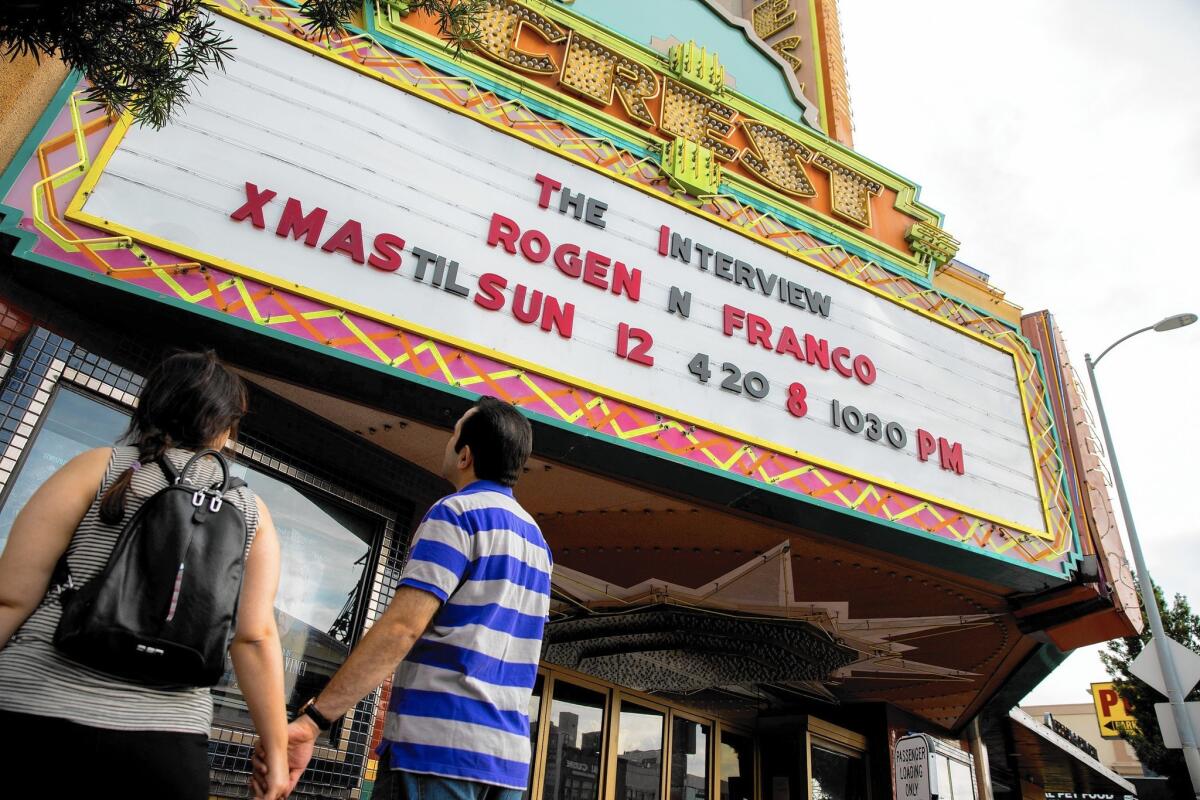Sony debuts ‘The Interview’ online, upending Hollywood-tech equation

Sony’s decision to stream the controversial comedy “The Interview” has upended the often fractious relationship between Silicon Valley’s biggest Internet company and Hollywood’s film industry.
Google has repeatedly clashed with major studios over the piracy of films, which can be readily viewed and downloaded online. In fact, leaked emails from the hack of Sony Pictures show that film studios launched a project to counter the influence of “Goliath,” a code name used for Google.
But on Wednesday, Sony turned to Google and other digital outlets to screen “The Interview” before its original Christmas Day release, underscoring the tech world’s evolving and complex ties with Hollywood.
The move could have a lasting effect on the way Americans watch first-run movies. The theater business has been dented as moviegoers increasingly view films at home instead of the cinema, and theater chains are anxious about their future.
“It may be a break in the dam,” said Jason E. Squire, a professor at the USC School of Cinematic Arts, and former executive at 20th Century Fox and United Artists. “It will really jumpstart the conversations that are tough to have,” about releasing more movies simultaneously in theaters and on the small screen.
Sony struck deals with Google Play, YouTube Movies and Microsoft’s Xbox Video to run “The Interview,” about the fictionalized assassination of North Korean leader Kim Jong Un. The movie also was made available through a stand-alone website, www.seetheinterview.com, that’s run by the studio, which also held talks about a potential release to Netflix.
The patchwork distribution, which includes about 300 independent theaters, was in response to Sony’s decision to pull the film after big theaters decided to not run it. The studio was pressured after hackers leaked troves of data and sensitive emails in an unprecedented cyberattack, and then threatened moviegoers if they went to see the film.
Michael Lynton, Sony Pictures Entertainment chairman and chief executive, said the studio initially contacted Google, Microsoft and others on Dec. 17, the day it canceled its plans for a wider release.
“We chose the path of digital distribution first so as to reach as many people as possible on opening day,” Lynton said in a statement. “While we couldn’t have predicted the road this movie traveled to get to this moment, I’m proud our fight was not for nothing and that cyber criminals were not able to silence us.”
Fans of Seth Rogen and James Franco, who star in the film, jammed the various platforms as soon as the movie was released online.
Sony did not release any numbers on how the movie fared online, though there was an overwhelming response on social media as many people live-tweeted their reactions. Rentals cost $5.99, while customers can pay $14.99 to buy the movie.
Dan Rosenblum, a 28-year-old Raleigh, N.C., resident, said on Twitter that the film was “ridiculous, but also hilarious.” He streamed the film and watched it on a TV screen with his whole family on Christmas Eve.
“After the hacking, the film became a must-see,” he said. “I understand people get a little upset, but it’s a comedy just like ‘This Is The End’ and ‘Pineapple Express.’”
On first blush, Google would seem like an unlikely candidate to lend a hand to Sony. Emails recently leaked by Sony hackers presented Google in an unflattering light.
The emails showed lawyers from the Motion Pictures Assn. of America and the major studios discussing a strategy of working with state attorneys general to counter the influence of “Goliath,” an apparent reference to Google.
Google General Counsel Kent Walker blasted the MPAA in a blog post last week, accusing the group of trying to revive the controversial Stop Online Piracy Act (SOPA), the antipiracy bill that died in Congress in 2012 after online protests led by Google and other tech companies.
Despite the clashes, Google has quietly been courting Hollywood for the last few years to repair frayed relations and secure lucrative content deals for its video services. One of the biggest moves the tech giant made was the 2010 hiring of Robert Kyncl as head of global business at YouTube.
Kyncl is a longtime Hollywood veteran, and was most recently the head of digital content acquisition at Netflix. He was tasked by Google to help the company navigate Hollywood.
In an interview with The Times in late November, just days before the Sony hacking came to light, Kyncl said the tech giant has successfully “been melding the world of Google with Hollywood.”
One way Google has lured studios has been through the creation of its YouTube Space, a 41,000-square-foot production video facility based in Playa Vista. In December, the company expanded its presence by purchasing another 12 acres in the same area.
The space is used by the YouTube community to create and edit their videos. But it has increasingly become a draw for Hollywood to make its own content to promote upcoming films.
For instance, Lions Gate also used the YouTube space to create online promotions for the latest movie in the “Hunger Games” franchise.
“It’s attracted a lot of eyeballs,” Kyncl said. “That’s really great for us and for them because it is increasing awareness of [movies] they are about to release. … It’s a mutually beneficial relationship.”
Putting out a major broad comedy through on-demand vendors at the same time as a theatrical debut — known in the industry as a day-and-date release — is a highly unusual strategy, considering the film was originally intended for about 3,000 locations.
The decision hit a raw nerve in the exhibition industry, which has fiercely resisted attempts in the past to shorten the traditional theatrical window. Typically, major Hollywood movies like “The Interview” are made available in the home three to four months after they debut in theaters.
While it’s not uncommon for independent films to be released in the home when or near when they debut in theaters, it’s rare for studios to use such a strategy for a major film. Industry executives could not recall the last time a major studio film was released before it had even opened in theaters.
Many theater chains, including the nation’s four largest, have refused to screen “The Interview” on Christmas Day partly out of concern that the digital release plans undermine the traditional theatrical window that has given them exclusive access to movies.
Phil Zacheretti, president and chief executive of Phoenix Big Cinemas in Knoxville, Tenn., said his company would not show “The Interview” on any of its 97 screens on Christmas Day.
“It’s just a non-starter for us,” he said. “It’s not good for our future, it’s not good for the industry, and we just don’t do that.... We were looking forward to that film. That’s a good chunk of revenue for our holiday season.”
Twitter: @rverrier, @saba_h, @RFaughnder
More to Read
From the Oscars to the Emmys.
Get the Envelope newsletter for exclusive awards season coverage, behind-the-scenes stories from the Envelope podcast and columnist Glenn Whipp’s must-read analysis.
You may occasionally receive promotional content from the Los Angeles Times.









